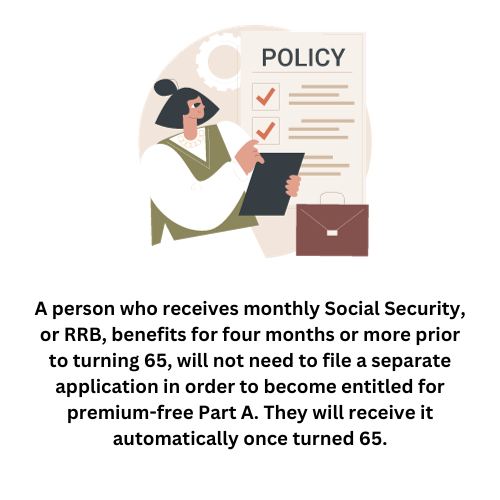
by Russell Noga | Updated July 30th, 2023
 Medicare is a federal U.S. healthcare program that is available for certain groups of people to take advantage of and get covered by, provided that they are eligible for it.
Medicare is a federal U.S. healthcare program that is available for certain groups of people to take advantage of and get covered by, provided that they are eligible for it.
It has been commonly known to be for senior citizens who have been working for a number of years and are retired, but this is not entirely true as more than just this group are eligible for Medicare.
Medicare has been a somewhat controversial topic in U.S. politics due to it being ever more expensive as the pool of participants taking advantage of it grows. Basically, more people are entering retirement age now than ever and living longer than ever before.
Thus, the amount of people supported keeps growing and this is an expense U.S. taxpayers have to pay for.
Different Types of Medicare
There are a lot of different aspects to Medicare, and they are separated by parts that sometimes go together and sometimes are separate entities that can be enrolled independently of one another. We can differentiate between parts A through D of Medicare.
Medicare Part A is hospital insurance. Most people get Part A for free, but some have to pay a premium for this coverage. Meanwhile, Medical Part B is medical insurance.
Both part A and Part B fall under the Original Medicover.
Medical Type C combines both types into one and is called Medicover Advance. It also tends to include Part D within its coverage, in addition to some extra benefits such as vision, hearing, and dental services. Medicover Part D is drug coverage.
Get Quotes in 2 Easy Steps!
Enter Zip Code
Medical Eligibility Analyzed
Medicare Coverage goes beyond just senior citizens and retirees within the U.S. Medical eligibility covers three different groups of people. The three groups of people who can sign up for Medicare include people over the age of 65, the disabled, and those with End-Stage Renal Disease (ESRD).
Some individuals must pay a premium, whereas others can get it premium-free. This depends on a number of factors, notably how long someone has been working or paying Medicare taxes before signing up. According to Medicare.gov, most people pay $0 for Part A, with a deductible of $1,600 for each hospital admission.
In order to be eligible for premium-free Part A Medicare, or hospital insurance, an individual must be able to receive Medicare based on their own earnings, or the earnings of a spouse, parent, or child. The individual must also have a specified number of quarters of coverage (QCs) and file an application for Social Security or Railroad Retirement Board (RRB) benefits.
The exact number of QCs required for such a filing depends on whether the individual is filing for Part A on the basis of age, disability, or End Stage Renal Disease (ESRD).
According to Medicare.Gov, “QCs are earned through payment of payroll taxes under the Federal Insurance Contributions Act (FICA) during the person’s working years. Most individuals pay the full FICA tax so the QCs they earn can be used to meet the requirements for both monthly Social Security benefits and premium-free Part A.”
In some cases, it is also possible to be eligible based on age alone. In order to achieve that eligibility for Part A, the individual must be age 65 or older and be eligible for monthly Social Security or RRB cash benefits. Read on to find out more about Medicare eligibility requirements and what it takes to qualify under different conditions.
Medical Eligibility Requirements
A person who receives monthly Social Security, or RRB, benefits for four months or more prior to turning 65, will not need to file a separate application in order to become entitled for premium-free Part A. They will receive it automatically once turned 65.
 However, if a person hasn’t been receiving monthly Social Security, or RRB, benefits, for at least four months prior to turning 65, they will have to file an application for Medicare by contacting the Social Security administration.
However, if a person hasn’t been receiving monthly Social Security, or RRB, benefits, for at least four months prior to turning 65, they will have to file an application for Medicare by contacting the Social Security administration.
In order to become eligible the same month an individual turns 65, the person must have filed an application for Part A within a six-month window of turning 65. If the application is filed six months after turning 65 or longer, Part A coverage will be retroactive for six months.
It is also worth noting that if someone turns 65 on the first day of a given month, Part A coverage can begin on the first day of the preceding month. For instance, if one’s birthday falls on August 1st, Part A can begin on July 1st.
Individuals who cannot qualify for premium-free coverage do not automatically get covered when they turn 65. Instead, they must file an application in order to enroll by contacting their Social Security administration, enroll during a valid enrollment period, and have to also enroll in Part B simultaneously to enroll in part A.
In order to keep part A coverage, the individual must continue to pay all monthly premiums for both part A and Part B in a timely manner. Coverage begins in the month following their enrollment.
Medicare Eligibility Based on Disability or End-Stage Renal Disease
In order to enroll based on disability, a person must be entitled to monthly Social Security or RRB benefits on the basis of some sort of disability. They then are automatically entitled to Part A Medicare after receiving disability benefits for 24 months.
Federal, state, or local government employees who have a disability, but are not eligible for monthly Social Security or RRB benefits, may become entitled for disability benefits and Part A Medicare after being disabled for 29 months.
In terms of eligibility based on end-stage renal disease (ESRD), if individuals receive regular dialysis treatments or a kidney transplant, and have filed an application for Medicare, they may be eligible for premium-free Part A Medicare.
They also have to meet one of the following conditions:
- have worked the required amount of time under Social Security, the RRB, or as a government employee;
- are getting or are eligible to receive Social Security or RRG benefits;
- or are the spouse or dependent child of a person who worked a required amount of time under Social Security, RRB, or as a government employee (and may even be receiving it).
Is Medicare Required After Turning 65?
You may still be working and receiving insurance under your employer with no plans to get on Medicare anytime soon, despite being over 65 years of age. The good news is that you can wait if you feel so inclined, at least in some cases.

According to Medicare.gov, you can actually wait until you or your spouse stops working or even lose your health insurance from your employer (but somehow may still be working for them), in order to sign up for Part B. If you do this, you will not have to pay a late enrollment penalty.
Also of note when it comes to Part A is that if you qualify for premium-free Part A, hospital insurance, you can choose to either sign up when you turn 65 or at any time afterwards.
Your job-based insurance usually will pay first in cases of medical treatment while Medicare pays second or covers the rest if you qualify.
Consider Medigap to Help Pay for Original Medicare Premium Costs
If you do not qualify for premium-free Medicare, consider getting Medicare Supplement Insurance (Medigap). This is extra insurance you can buy from a private health insurance company to help pay your share of out-of-pocket costs in Original Medicare.
One company that specialises in this service is us at MediSupps. You can view different plans by entering your ZIP Code to see options available to you and find out if it is worth it. These supplement plans are made to work with and not compete with Medicare.
View 2024 Plans & Rates
Enter Zip Code
However, it is worth noting that in order to purchase Medigap, You must have Original Medicare – both Part A (Hospital Insurance) and Part B (Medical Insurance).
Final Thoughts
Medicare eligibility is no simple topic and different people fall under different guidelines. There are many different cases or types of individuals that may or may not fall under different plans or qualify for premium-free Medicare or not.
Hopefully, now you have a good baseline idea of whether you qualify for Medicare or not and how to take advantage of your needs regarding being covered when the time is right for you.
Frequently Asked Questions
Who is eligible for Medicare?
Generally, individuals who are 65 years or older and U.S. citizens or permanent residents for at least five years are eligible for Medicare. Additionally, some younger individuals with certain disabilities or end-stage renal disease (ESRD) may also qualify.
What are the different parts of Medicare?
Medicare consists of four main parts: Part A (hospital insurance), Part B (medical insurance), Part C (Medicare Advantage), and Part D (prescription drug coverage).
Does Medicare cover all healthcare costs?
No, Medicare does not cover all healthcare costs. Beneficiaries are responsible for various out-of-pocket expenses, such as deductibles, copayments, and coinsurance.
What is the difference between Medicare Part A and Part B?
Medicare Part A covers inpatient hospital stays, skilled nursing facility care, hospice care, and some home health services. Part B covers outpatient medical services, doctor visits, preventive care, and durable medical equipment.
What is the Medicare Supplement Open Enrollment Period?
The Medicare Supplement Open Enrollment Period is a six-month period that starts when you are both 65 or older and enrolled in Medicare Part B. During this period, you have guaranteed issue rights and can enroll in any Medigap plan without medical underwriting.
What is the difference between Medicare Supplement Plan G and Plan N?
Both Plan G and Plan N are Medigap plans that offer standardized benefits. Plan G provides comprehensive coverage, except for the Part B deductible, which beneficiaries must pay out of pocket. Plan N has lower premiums but may require copayments for certain services and excess charges.
Can I have Medicare Supplement coverage if I am on a Medicare Advantage plan?
No, you cannot have both Medicare Supplement and Medicare Advantage coverage at the same time. You must choose one or the other.
Is there a penalty for enrolling in Medicare late?
Yes, there can be penalties for enrolling late in Medicare Part B and Part D. It’s essential to enroll during your Initial Enrollment Period to avoid these penalties.
Are Medicare Supplement plans standardized across all states?
Yes, Medigap plans are standardized by the federal government, so the benefits are the same regardless of the state you live in.
Can I change my Medicare Supplement plan at any time?
Generally, you can switch Medigap plans at any time during the year. However, you may be subject to medical underwriting and may not have guaranteed issue rights if you switch outside the Medigap Open Enrollment Period.
Call Our Team for a Free Consultation on Medicare and Medicare Supplement
Speak to a Medicare and Medigap expert at 1-888-891-0229 for a free consultation on the right Dental insurance plan for you.
Our fully licensed agents offer professional advice and quotes from leading healthcare providers for the best rates on Medigap and Medicare Advantage plans.
If you can’t talk right now, leave your details on our contact form, and we’ll get an agent to connect with you.

Russell Noga is the CEO and Medicare editor of Medisupps.com. His 15 years of experience in the Medicare insurance market includes being a licensed Medicare insurance broker in all 50 states. He is frequently featured as a featured as a keynote Medicare event speaker, has authored hundreds of Medicare content pages, and hosts the very popular Medisupps.com Medicare Youtube channel. His expertise includes Medicare, Medigap insurance, Medicare Advantage plans, and Medicare Part D.


